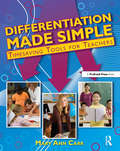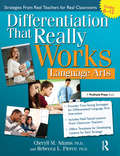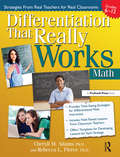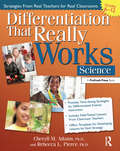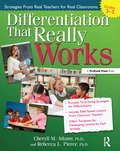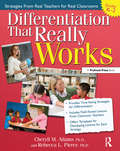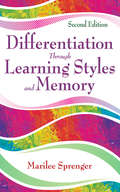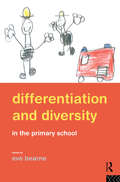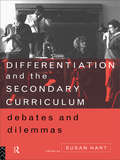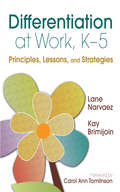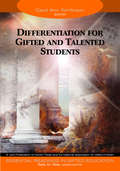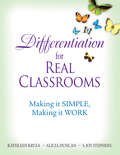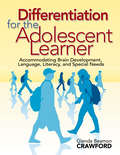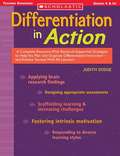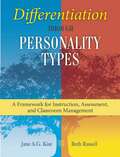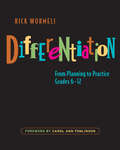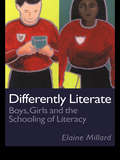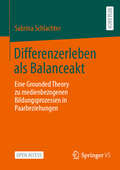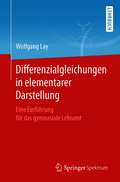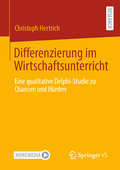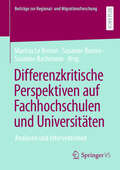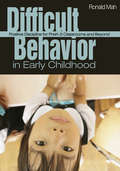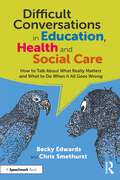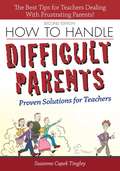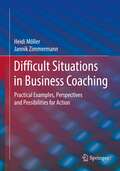- Table View
- List View
Differentiation Made Simple: Timesaving Tools for Teachers
by Mary Ann CarrDifferentiation is a practice that is beneficial to every student. Rather than focusing on leaving no child behind, differentiation aims to move every child ahead. The trouble for many teachers is, however, that differentiating for all students can be time consuming. Differentiation Made Simple will help classroom teachers overcome time constraints and other obstacles to differentiation by providing a wealth of ready-made and generic tools they can employ right away. The tools include task cards for literature, creative writing, and research; tic-tac-toe menus; graphic organizers; and guides to creating differentiated units—each one tied to specific questions and concerns teachers have about differentiating instruction. Also included are product lists and other assessment ideas, including rubrics and a scoring conversion table. Written especially for teachers in the trenches, Differentiation Made Simple will help unlock the door to creating a classroom where every child is challenged by work appropriate for his or her abilities, interests, and learning styles.
Differentiation That Really Works: Language Arts (Grades 6-12)
by Cheryll M. Adams Rebecca L. PierceDifferentiation That Really Works: Language Arts provides time-saving tips and strategies from real teachers who teach language arts in grades 6-12. These teachers not only developed the materials and used them in their own classes, but they also provided useful feedback and comments about the activities. The strategies included in the book are tiered lessons, cubing, graphic organizers, exit cards, learning contracts, and choice boards. Every strategy includes directions and offers opportunities for differentiation.Grades 6-12
Differentiation That Really Works: Math (Grades 6-12)
by Cheryll M. Adams Rebecca L. PierceDifferentiation That Really Works: Math (6-12) provides time-saving tips and strategies from real teachers who teach math in grades 6-12. These teachers not only developed the materials and used them in their own classes, but they also provided useful feedback and comments about the activities. The strategies included in the book are tiered lessons, cubing, graphic organizers, exit cards, learning contracts, and choice boards. Every strategy includes directions and offers opportunities for differentiation.Grades 6-12
Differentiation That Really Works: Science (Grades 6-12)
by Cheryll M. Adams Rebecca L. PierceDifferentiation That Really Works: Science provides time-saving tips and strategies from real teachers who teach science in grades 6-12. These teachers not only developed the materials and used them in their own classes, but they also provided useful feedback and comments about the activities. The strategies included in the book are tiered lessons, cubing, graphic organizers, exit cards, learning contracts, and choice boards. Every strategy includes directions and offers opportunities for differentiation.Grades 6-12
Differentiation That Really Works: Strategies From Real Teachers for Real Classrooms (Grades 3-5)
by Cheryll M. Adams Rebecca L. PierceDifferentiating requires more than just a simple bag of tricks. Teachers need to have concrete strategies if they want to provide choice and challenge for all learners in their classroom. The strategies included in this book were chosen based on their ease of implementation and modification. In addition, they all encourage student engagement, provide inherent opportunities for differentiation, and are appropriate for multiple grade levels.Differentiation That Really Works provides time-saving strategies and lesson ideas created and field-tested by practicing professionals in their own heterogeneous classrooms. These lessons can be used as written or can be modified to meet the needs of a particular classroom. The book also provides templates that can be used to develop new lessons using each strategy. These strategies, including exit cards, choice boards, cubing, graphic organizers, learning contracts, and tiered lessons, help pave the way to a differentiated classroom that meets all students' needs!Grades 3-5
Differentiation That Really Works: Strategies From Real Teachers for Real Classrooms (Grades K-2)
by Cheryll M. Adams Rebecca L. PierceDifferentiating requires more than just a simple bag of tricks. Teachers need to have concrete strategies if they want to provide choice and challenge for all learners in their classroom. The strategies included in this book were chosen based on their ease of implementation and modification. In addition, they all encourage student engagement, provide inherent opportunities for differentiation, and are appropriate for multiple grade levels.Differentiation That Really Works provides time-saving strategies and lesson ideas created and field-tested by practicing professionals in their own heterogeneous classrooms. These lessons can be used as written or can be modified to meet the needs of a particular classroom. The book also provides templates that can be used to develop new lessons using each strategy. These strategies, including exit cards, choice boards, cubing, graphic organizers, learning contracts, and tiered lessons, help pave the way to a differentiated classroom that meets all students' needs!Grades K-2
Differentiation Through Learning Styles and Memory
by Marilee B. SprengerHelp students lead with their strengths and gain a deeper understanding of concepts! This updated edition of the bestseller demonstrates how to optimize achievement by using brain-based strategies that address students’ social/emotional, cognitive, and physical learning preferences. The author offers graphic organizers, current research on memory, and new charts to help implement differentiated strategies, and also provides: An explanation of how the brain processes, stores, and retains information Pre-assessment strategies for each learning style “Reflect and Connect” questions for teacher self-assessment Learning and memory tips for students Exit cards, or quick assessments of what students have learned
Differentiation and Diversity in the Primary School
by Eve BearneDifferentiation is a key part of effective teaching; structuring learning experiences to suit the needs of the individual child plays a major part in the quality of the education that child receives. However, even experienced teachers can often struggle to achieve this ideal when considering the needs of a class, which is likely to include pupils across the whole ability range, from students with learning difficulties through to gifted children. Written by practising teachers this collection: * examines the definitions and scope of differentiation * looks at the structuring and management of learning activities within the curriculum areas of key stages 1 and 2 * shows how teachers can provide equal access to the curriculum for all children, whilst also meeting government requirements * discusses issues of assessment * describes how schools can construct a whole school policy and approach for differentiation. Using case studies and examples, this book will lead teachers to reflect on their current practice, whilst also containing practical advice which will enable them to improve.
Differentiation and the Secondary Curriculum: Debates and Dilemmas
by Susan HartDifferentiation is a key part of effective teaching and is currently an INSET priority for many secondary schools. By giving real-life examples, this book makes links between the theory of differentiation and some of the wide range of good practice already happening in schools. It explores the meaning and issues surrounding terms like 'differentiation' and 'equal opportunities' and offers practical strategies for tackling this often difficult area. The text provides helpful case studies written by practising teachers and gives useful examples of tested INSET activities.
Differentiation at Work, K-5: Principles, Lessons, and Strategies
by M. Lane Narvaez Kay BrimijoinWatch what happens when educators put differentiation to work in real classrooms! Based on research and the authors’ experiences at one remarkable elementary school, this book describes what schoolwide differentiation looks like in practice. The authors show school administrators how differentiated instruction can be successfully implemented schoolwide and provide teachers with authentic tools for the classroom. Readers will find: Nine sample lesson plans from various disciplines and grade levels Teacher and student voices describing their experiences with differentiation A chapter on supporting schoolwide implementation through coaching Sample preassessments Strategies for designing and refining lessons
Differentiation for Gifted and Talented Students
by Sally M. Reis Dr Carol Ann TomlinsonFocusing on the link between gifted education and general education, this resource discusses the benefits of differentiating curriculum and instruction.
Differentiation for Real Classrooms: Making It Simple, Making It Work
by Kathleen Kryza Alicia M. Duncan S. Joy StephensWith illustrations, vignettes, sample lessons, and adaptations for ESL and students with special needs, this book offers dozens of practical strategies for differentiating lessons to reach all learners.
Differentiation for the Adolescent Learner: Accommodating Brain Development, Language, Literacy, and Special Needs
by Glenda Beamon CrawfordActivate learning with practical techniques that put brain research and technology into practice! Translating brain research into practical classroom strategies, this valuable resource for adolescent-centered teaching provides keys to curriculum design, instruction, and assessment within the context of a developmentally appropriate, differentiated approach. This book focuses on learners’ intellectual, social, and emotional needs and equips teachers with: A six-point differentiation model Tactics tailored to English Language Learners, gifted learners, and students with special needs Ways to capitalize on technology Brain-friendly instructional practices grounded in universal design for learning (UDL) Techniques to create environments aligned with adolescents’ specific developmental needs
Differentiation in Action: A Complete Resource with Research-supported Strategies to Help You Plan and Organize Differentiated Instruction--and Achieve Success with All Learners
by Judith DodgeA practical guide full of use-tomorrow strategies to help teachers make differentiated instruction work to support all learners translate research into action, inform your instruction through on-going pathways for learning, foster "intrinsic' motivation, use "instructional intelligence," and more.
Differentiation through Personality Types: A Framework for Instruction, Assessment, and Classroom Management
by Jane A. KiseLeverage proven teaching strategies to motivate all students!Students' learning styles are as unique as their personalities. As a result, the most successful teachers are often those who understand how to adjust their educational techniques to honor students of all intelligences and backgrounds. This comprehensive resource, based on the author's years of research and experience, presents a usable, understandable framework that assists K-12 teachers in achieving success in today's differentiated classroom.From easy-to-implement techniques to detailed templates for planning lengthy curriculum units, teachers receive clear direction for appealing to the learning personalities in their diverse classrooms. Readers will also find: Relevant stories, exercises, and examples to illustrate differentiated classroom instruction Balanced advice for improving student growth and performance in small-group work, class discussions, and relationship building Practical ideas and activities for immediate application in the classroomThis book gives teachers a toolkit they can use to create an effective learning experience for any student. Discover teaching techniques that result in success for students of all learning styles!
Differentiation: From Planning to Practice, Grades 6-12
by Rick WormeliDifferentiation: From Planning to Practice , author Rick Wormeli provides an overview of the cognitive science behind differentiation. As a teacher, you know a one-size-fits-all education doesn't work; students are more diverse than ever. In his book, Wormeli gives a step-by-step process to create a fully crafted differentiation lesson and shows the necessary planning for an effective lesson design for diverse classrooms.Wormeli demonstrates how to weave common and novel differentiation strategies into all subjects and offers clear advice about what to do when things don't go as expected. Based on nearly thirty years of experience as a teacher and instructional coach, his thoughtful and imaginative classroom accommodations will help teachers succeed with advanced students, struggling students, English language learners, and students across the multiple intelligences spectrum. Differentiation provides a practice guide to create lessons that will prepare students for real life success and build their critical thinking skills in the process.
Differently Literate: Boys, Girls and the Schooling of Literacy
by Elaine Millard Dr Elaine MillardPresents research into the differences in boy's and girl's experiences of the reading and writing curriculum at home and in school. The book is presented in three sections: an outline of the theoretical debates on gender difference and academic achievement; a description of the research into these issues conducted by the author; and an analysis of the author's findings. In discussing the outcome of her research, the author aims to highlight further areas for more detailed study and makes recommendations for the development of literacy policies, which cross curriculum boundaries in schools.
Differenzerleben als Balanceakt: Eine Grounded Theory zu medienbezogenen Bildungsprozessen in Paarbeziehungen
by Sabrina SchlachterIn diesem Open-Access-Buch wird der Frage nachgegangen, inwiefern medienbezogene Bildungsprozesse in Paarbeziehungen stattfinden. In der heutigen Informationsgesellschaft stehen Individuen in einer Paarbeziehung vor der Herausforderung, mit digitalen Transformationsprozessen umzugehen. Hierzu liegt eine Vielzahl von Studien vor, die Veränderungen durch Medien im Paaralltag untersuchen. Doch hinsichtlich medienbezogener Bildungsprozesse – bei denen eine Veränderung des Selbst- und Weltbezugs geschieht – werden Paarbeziehungen in der Forschung bislang vernachlässigt. Es wurden 16 Paarinterviews geführt, welche durch Medientagebücher vorbereitet wurden. In der Auswertung mittels Grounded Theory Methodologie wurde eine Theorie zu medienbezogenen Bildungsprozessen in Paarbeziehungen entwickelt. Das zentrale Phänomen sind hierbei Differenzerleben, welche einen Balanceakt in Paarbeziehungen darstellen, und auf die unter bestimmten Voraussetzungen medienbezogene Bildungsprozesse folgen können. Die möglichen Kombinationen von Voraussetzungen sind in fünf Typen von Paaren mit spezifischen Umgangsweisen bzgl. des Phänomens festgehalten. Darunter sind u. a. Paare, die medienbezogene Bildungsprozesse forcieren, diese durch ihre Paar-Dynamik ermöglichen oder sie der Beziehungsstabilität zuliebe verhindern.
Differenzialgleichungen in elementarer Darstellung: Eine Einführung für das gymnasiale Lehramt
by Wolfgang LayDieses Lehrbuch leitet von den klassischen Schulinhalten der Analysis direkt zu einer Kategorisierung und Analyse spezieller (insbesondere linearer) Differenzialgleichungen über. Es betrachtet somit die klassische Analysis aus einer ungewohnten Perspektive und vermittelt inhaltlich zwischen dem mathematischen Denken an Gymnasien einerseits und an Hochschulen/Universitäten andererseits. Dabei werden Definitionen weniger formal, sondern vielmehr als Handlungsanweisung, also funktional betrachtet. Beim mathematischen Beweis geht es weniger darum, eine Wahrheit zu entdecken, als vielmehr darum, eine Einsicht zu vermitteln. Die verwendeten mathematischen Zeichen erheben keinen Absolutheitsanspruch, sondern sollen im Betrachter ein Bild erzeugen. Dieses Buch möchte so eine Weiterentwicklung in der Didaktik anstoßen; es richtet sich daher primär an Studierende und Dozenten im gymnasialen Lehramt der Mathematik, aber auch an SchülerInnen der gymnasialen Kursstufe, welche ein mathematikaffines Studium ins Auge fassen und daher den Übergang von der gymnasialen Kursstufe zum Studium der Mathematik oder eines mathematikaffinen Faches zu bewältigen haben. Es möchte sie dazu ermutigen, die Mathematik als einen großen Werkzeugkasten zu begreifen, mit dessen Hilfe sich auf unglaublich vielen Gebieten alltägliche wie nicht alltägliche Fragen lösen und Sachverhalte quantifizieren lassen.
Differenzierung im Wirtschaftsunterricht: Eine qualitative Delphi-Studie zu Chancen und Hürden
by Christoph HertrichChristoph Hertrich untersucht in dieser Studie die Chancen und Hürden einer Differenzierung im Wirtschaftsunterricht. Auf Basis einer Delphi-Experten-Befragung identifiziert er domänenspezifische und überfachliche Aspekte, die bei der Konzeption von differenzierenden Lehr-Lernarrangements berücksichtigt werden sollten. Damit wird ein zentraler Beitrag zur Unterrichtsforschung im Bereich der ökonomischen Bildung geleistet, der zugleich wertvolle Impulse für die Praxis liefert.
Differenzkritische Perspektiven auf Fachhochschulen und Universitäten: Analysen und Interventionen (Beiträge zur Regional- und Migrationsforschung)
by Susanne Bachmann Maritza Le Breton Susanne BurrenZiel dieses Sammelbands ist es, historisch-theoretische, empirische und handlungsbezogene Zugänge zu Differenzkonstruktionen und (Un-)Gleichheiten sowie Diversitätsorientierung an (Fach-)Hochschulen und deren bildungspraktische Relevanz und Spannungsfelder aus kritisch-dekonstruktiver, postkolonialer und intersektionaler Perspektive zu beleuchten - dies mit Bezug auf aktuelle Diskurse über Diversität im Hochschulkontext, die eher an Ansätze der betriebswirtschaftlichen Organisationsentwicklung ausgerichtet sind. So kann Diversity-Management unter Beachtung hochschulinterner Diversitätsleitsätze soziale Positionierungen festschreiben, wodurch eine Re-Essentialisierung stattfinden kann. Eine Betrachtungsweise im Sinne einer kritischen, emanzipatorischen und antidiskriminierenden Perspektive, welche soziokulturelle Bedingungen von Studierenden und Mitarbeitenden an (Fach-)Hochschulen berücksichtigt, ist hingegen selten anzutreffen. Im Fokus alternativer Ansätze steht eine differenzreflexive Hochschule, welche auf die Dekonstruktion von natürlich erscheinenden Differenzlinien zielt, mit der Absicht, nicht nur essentialistische Diskurse zu hinterfragen, sondern auch eine Veränderung der darin eingebundenen geschlechts-, disziplin- und generationenspezifischen Habitusformen zu bewirken.
Difficult Behavior in Early Childhood: Positive Discipline for PreK-3 Classrooms and Beyond
by Ronald MahIncrease your understanding of children to guide and shape behavior in positive ways! The author assists teachers in observing and understanding children so that they can respond appropriately to difficult behaviors, and enable children to make good behavioral choices for themselves. In an engaging, conversational tone, the book covers: Reconciling the different behavioral expectations of families and schools Applying timeout effectively Motivating children immediately and powerfully Establishing and following through with boundaries Developing behavior incentive plans that work Identifying early signs of depression, anxiety, grief, and special needs
Difficult Conversations in Education, Health and Social Care: How to Talk About What Really Matters and What to Do When it All Goes Wrong
by Becky Edwards Chris SmethurstThis accessible guide combines evidence-based research with practical experience to help develop effective communication skills for navigating difficult or challenging situations.The book delves into what it means to be an effective and confident communicator, before addressing how to approach those often-avoided ‘difficult conversations.’ Key features include: Strategies for tackling tough topics, from handling emotional outbursts to addressing both conscious and unconscious reactions Approaches for discussing sensitive issues like trauma, sexuality, gender, race, and serious concerns Engaging case studies, scenarios, activities, and top tips to support discussions Practical advice on how to enhance communication skills and prevent difficult conversations from escalating Exploring concepts and techniques that can be applied across various professions and in personal life The authors emphasise the importance of applying the right skills, knowledge, and experience to transform a challenging conversation into an effective, solution-focused, and collaborative exchange. With innovative ideas for making tough discussions more manageable, this book is an invaluable resource for professionals in education, social services, healthcare, and similar fields.
Difficult Parents
by Suzanne Capek TingleyBe it "Pinocchio's Mom," who thinks her child never lies, the "Caped Crusader," who will stop at nothing to have a book eliminated from the curriculum, or the "Helicopter Mom," who hovers and swoops in to protect her child from disappointment, this humorous handbook helps educators deal with impossible parents. Each chapter features a hilarious caricature that illuminates common parent anxieties followed by specific, practical methods for addressing the problem. Easily implemented advice on face-to-face confrontations helps teachers approach each conflict with the confidence to get their point across and the composure to keep their professional principles intact.
Difficult Situations in Business Coaching: Practical Examples, Perspectives and Possibilities for Action
by Heidi Möller Jannik ZimmermannCoaches encounter a range of situations in their professional practice that they experience as difficult. The challenges have different sources. They can come from the coaches themselves, the coachees or the commissioning organization. But how do these situations present themselves in detail? How can coaches understand them and respond appropriately? Using real case studies collected online, this book takes a closer look at difficult situations. In doing so, renowned coaches present for discussion their theoretical and methodological perspectives and their recommendations for action. This book is a translation of the original German 1st edition Schwierige Situationen im Business-Coaching by Heidi Möller and Jannik Zimmermann, published by Springer Fachmedien Wiesbaden GmbH, part of Springer Nature in 2020. The translation was done with the help of artificial intelligence (machine translation by the service DeepL.com). A subsequent human revision was done primarily in terms of content, so that the book will read stylistically differently from a conventional translation. Springer Nature works continuously to further the development of tools for the production of books and on the related technologies to support the authors.
